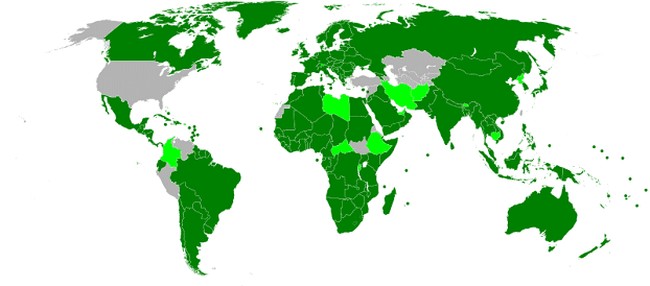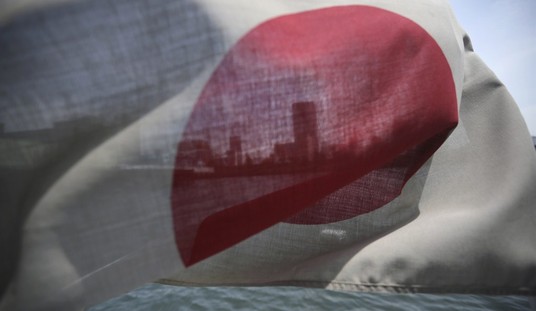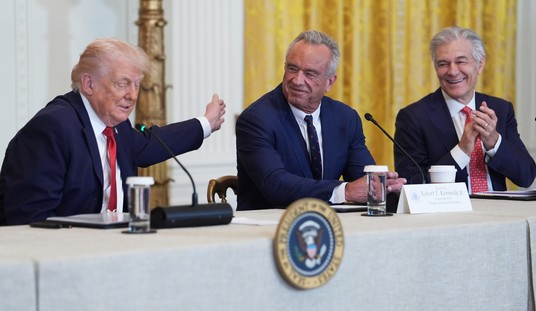Today Barack Obama gave the commencement address at the United States Military Academy at West Point. While the address was billed as his “foreign policy vision” it was vintage Obama: banal, deceptive, self-serving, and partisan to the very core. Sort of a metaphor for them man himself.
He led off by proclaiming success. He trotted out Osama bin Laden’s putrescent corpse for effect. He claims, rightfully, that al Qaeda’s leadership in the Pakistan-Afghanistan border region has been “decimated.” He failed to acknowledge that the policies undertaken by his administration have given al Qaeda two new safe havens, Libya and Syria, and enabled al Qaeda to become resurgent in Iraq.
Not content to articulate his vision of the future, he has to malign those who differ with him.
In fact, by most measures, America has rarely been stronger relative to the rest of the world. Those who argue otherwise – who suggest that America is in decline, or has seen its global leadership slip away – are either misreading history or engaged in partisan politics. Think about it. Our military has no peer. The odds of a direct threat against us by any nation are low, and do not come close to the dangers we faced during the Cold War.
By any standard, the American economy is in tatters. Real wages have declined. Energy costs, exacerbated by the boneheaded policies instigated by Obama, continue to increase with their greatest impact on those Americans who have already seen their job prospects, earnings, and the value of their home battered. While we may not face an existential challenge like we did during the Cold War, the Cold War has been over for fifteen years. The real point of comparison is our standing in the world since 1990. NATO is coming unraveled because of Obama’s lack of leadership. Japan and China seem destined for armed conflict. China is establishing hegemony over the South China Sea. Russia is creating a sphere of influence that replicates the old Soviet Union. It would be difficult to find a sane person who thinks we are respected now as much as we were in 2008.
He goes on:
And when a typhoon hits the Philippines, or girls are kidnapped in Nigeria, or masked men occupy a building in Ukraine – it is America that the world looks to for help. The United States is the one indispensable nation. That has been true for the century passed, and will likely be true for the century to come.
And how is that working out for Nigeria or Ukraine? How is it working out for the people in Libya and Syria where we instigated civil wars?
From there we go to an internal dialog Obama has in his own brain. He divides the nation into interventionists and isolationists, or as he calls them “self-described realists.” Spoiler Alert. He thinks they are both wrong and his way, arrived at in sort of a Goldilocks and the Three Bears way, is neither too interventionist or too isolationist.
Each side can point to history to support its claims. But I believe neither view fully speaks to the demands of this moment. It is absolutely true that in the 21st century, American isolationism is not an option. If nuclear materials are not secure, that could pose a danger in American cities. As the Syrian civil war spills across borders, the capacity of battle-hardened groups to come after us increases. Regional aggression that goes unchecked – in southern Ukraine, the South China Sea, or anywhere else in the world – will ultimately impact our allies, and could draw in our military.
After reducing principled disagreement with his foreign policy to the crudest of caricatures he goes on to set out his foreign policy, the one that will last the remaining two years he has in office. (Shouldn’t he have thought of this in, like, 2009? Just askin’)
Let me spend the rest of my time, then, describing my vision for how the United States of America, and our military, should lead in the years to come.
First, let me repeat a principle I put forward at the outset of my presidency: the United States will use military force, unilaterally if necessary, when our core interests demand it – when our people are threatened; when our livelihood is at stake; or when the security of our allies is in danger. In these circumstances, we still need to ask tough questions about whether our action is proportional, effective and just. International opinion matters. But America should never ask permission to protect our people, our homeland, or our way of life.
On the other hand, when issues of global concern that do not pose a direct threat to the United States are at stake – when crises arise that stir our conscience or push the world in a more dangerous direction – then the threshold for military action must be higher. In such circumstances, we should not go it alone. Instead, we must mobilize allies and partners to take collective action. We must broaden our tools to include diplomacy and development; sanctions and isolation; appeals to international law and – if just, necessary, and effective – multilateral military action. We must do so because collective action in these circumstances is more likely to succeed, more likely to be sustained, and less likely to lead to costly mistakes.
Not to put too fine a point on it, but how, exactly, does this differ from US foreign policy since 1945? It doesn’t. He seems to be taking a swipe at the last American president, George W. Bush, in his second paragraph. If so, it is a horrible mishmash of half-truths and outright lies. How could you watch the parade of sanctions, entreaties, UN speeches, and list of allies and claim Iraq was “go it alone.” It is a clear example of someone who is, to quote Barack Obama, “either misreading history or engaged in partisan politics.”
This leads to my second point: for the foreseeable future, the most direct threat to America at home and abroad remains terrorism. But a strategy that involves invading every country that harbors terrorist networks is naïve and unsustainable. I believe we must shift our counter-terrorism strategy – drawing on the successes and shortcomings of our experience in Iraq and Afghanistan – to more effectively partner with countries where terrorist networks seek a foothold.
How is this working out for us? What partnerships are we building in Libya or Syria? What are the prospects for an Afghan partnership when the president of that country refuses to meet with you? What partnership did you build to help Nigeria stop Boko Haram from growing?
A critical focus of this effort will be the ongoing crisis in Syria.
No freakin s***, Sherlock. And how did that crisis come about? How did the jihadis, which are the only effective opposition to the Assad regime, receive their weaponry? Doesn’t this qualify as one of the mistakes we should avoid?
I also believe we be more transparent about both the basis for our actions, and the manner in which they are carried out – whether it is drone strikes, or training partners. I will increasingly turn to our military to take the lead and provide information to the public about our efforts. Our intelligence community has done outstanding work and we must continue to protect sources and methods. But, when we cannot explain our efforts clearly and publicly, we face terrorist propaganda and international suspicion; we erode legitimacy with our partners and our people; and we reduce accountability in our own government.
To tell you the truth, I’m not even sure what this means other than the White House press office is staffed with lackwits that are unable to do their job. Most of the drone strikes are carried out by CIA because if they were carried out by the US military they would have a different connotation. Is Obama seriously suggesting that Defense will have to answer the mail when a CIA drone strike goes bad? Why is this in a “major” foreign policy address and not part of the daily White House press gaggle?
This issue of transparency is directly relevant to a third aspect of American leadership: our efforts to strengthen and enforce international order.
…
Of course, skeptics often downplay the effectiveness of multilateral action. For them, working through international institutions, or respecting international law, is a sign of weakness. I think they’re wrong. Let me offer just two examples why.
In Ukraine, Russia’s recent actions recall the days when Soviet tanks rolled into Eastern Europe. But this isn’t the Cold War. Our ability to shape world opinion helped isolate Russia right away. Because of American leadership, the world immediately condemned Russian actions. Europe and the G-7 joined with us to impose sanctions. NATO reinforced our commitment to Eastern European allies. The IMF is helping to stabilize Ukraine’s economy. OSCE monitors brought the eyes of the world to unstable parts of Ukraine. This mobilization of world opinion and institutions served as a counterweight to Russian propaganda, Russian troops on the border, and armed militias. This weekend, Ukrainians voted by the millions; yesterday, I spoke to their next President. We don’t know how the situation will play out, and there will be grave challenges. But standing with our allies on behalf of international order has given a chance for the Ukrainian people to choose their future.
Let’s review the bidding. Vladimir Putin astroturfed an independence movement in the Ukrainian territory of Crimea. He rolled his troops into Crimea, engineered a dubious referendum, and annexed Crimea. Russia has hardly been punished. France is moving ahead with the sale of four warships to Russia. Russian natural gas continues to flow into Europe, and euros flow to Moscow. As I write this the Ukrainian army is locked in ferocious combat with Moscow backed separatists in Eastern Ukraine. Moscow is upping the pressure on Moldova and Latvia. Our own Ex-Im Bank continues to provide loan guarantees to companies trading in Russia. Our lack of action has created the unprecedented situation of the Secretary General of NATO disagreeing with the United States. We do know how this will play out. Russia will take what it wants until a new administration comes into office and puts a stop to Putin’s marauding. If that man doesn’t appear, we look to be headed back to 1988. One the range of possible actions available to deter Russia before the annexation of Crimea we voted present.
Similarly, despite frequent warnings from the United States, Israel, and others, the Iranian nuclear program steadily advanced for years. But at the beginning of my presidency, we built a coalition that imposed sanctions on the Iranian economy, while extending the hand of diplomacy to the Iranian government. Now, we have an opportunity to resolve our differences peacefully. The odds of success are still long, and we reserve all options to prevent Iran from obtaining a nuclear weapon. But for the first time in a decade, we have a very real chance of achieving a breakthrough agreement – one that is more effective and durable than what would be achieved through the use of force. And throughout these negotiations, it has been our willingness to work through multilateral channels that kept the world on our side.
What is missing from this statement is any acknowledgement that Barack Obama subcontracted our negotiations with the Iranians to the Russians. He also fails to mention that Iran has forged ahead with its nuclear program. No one is saying stopping Iran from getting a nuclear weapon would be easy but Obama has gone about it in precisely the worst way, from his reliance on Russia as an intermediary to his burning down Status of Forces Agreement negotiations with Iraq that could have kept substantial US combat and logistics capabilities on Iran’s border.
This is American leadership. This is American strength.
Yes, indeed.
And now we move on to blaming Republicans.
You see, American influence is always stronger when we lead by example. We cannot exempt ourselves from the rules that apply to everyone else. We can’t call on others to make commitments to combat climate change if so many of our political leaders deny that it is taking place. It’s a lot harder to call on China to resolve its maritime disputes under the Law of the Sea Convention when the United States Senate has refused to ratify it – despite the repeated insistence of our top military leaders that the treaty advances our national security. That’s not leadership; that’s retreat. That’s not strength; that’s weakness. And it would be utterly foreign to leaders like Roosevelt and Truman; Eisenhower and Kennedy.
Climate change? We will be stronger in the world’s eyes if we accept climate change. The mind boggles. My brain is bleeding.
His whining about China is a non-sequitur. The map below shows the nations who have ratified the Law of the Sea Convention in dark green.
For Mr. Obama’s edification, that largish green blob at center-right is Communist China. As we are not a party to the disputes with China in the South China Sea, it doesn’t matter if we have ratified the convention or not. China has. And so has Japan, the Philippines, South Korea, and Vietnam. In other words, all the parties to the maritime dispute in the South China Sea are already bound by the Convention. What prevents China from negotiating with her neighbors under the framework of the Law of the Sea Convention is Chinese lawlessness not America refusing to sign onto a further degradation of its sovereignty.
Relatedly, the Constitution gives the power to ratify treaties to the United States Senate, not to our senior military leaders. Obama often forgets that we have one.
That’s why I will continue to push to close GTMO – because American values and legal traditions don’t permit the indefinite detention of people beyond our borders.
We just hit a time warp and re-entered 2007.
There are a few things that we can take away from this speech:
- There are no new ideas or concepts in this speech. This is a warmed over and inarticulate summation of American foreign policy since 1945.
- The priority placed by Obama on foreign policy is demonstrated by his giving the speech as a lame duck with barely two years remaining.
- He ignores the significant threat China poses to American interests.
- He seems to believe that his policy in Russia and Iran have been successful, thereby making him the only person in the world to have that belief.
- He didn’t mention his role in the disastrous Arab Spring which leads one to believe he has figured out that was not a success.
- Republicans are evil.
- Osama bin Laden and Francisco Franco are still dead.
Our allies are whimpering and quietly crapping themselves right now.















Join the conversation as a VIP Member